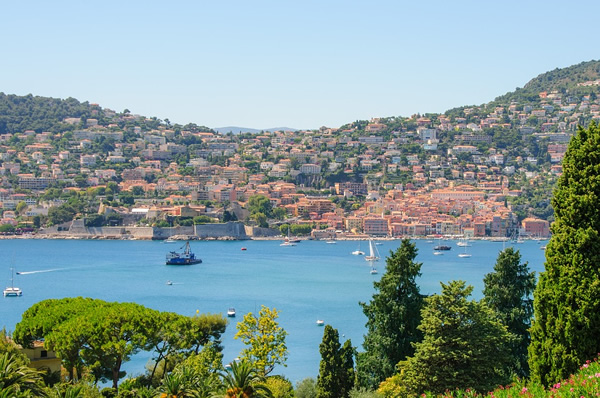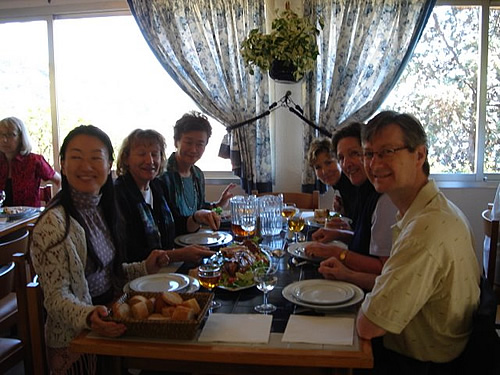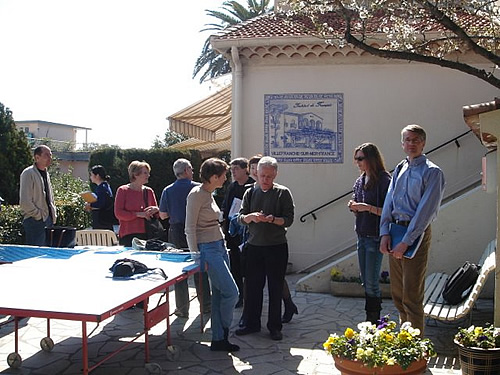Retire and Learn French on the French Riviera in Style
By Ferriel Brooks

|
|
View of the Bay of Villefranche.
|
Retirement loomed. After 35 years of living in the pressure cooker of Hong Kong, it was time to ride off into the sunset. Our daughters had left home, and we decided that if we had to retire, we might as well do it in style. So the French Riviera it was.
“Can we afford it?” I asked my husband, Mike.
“Probably not,” he replied, and proceeded to trace a circle of 20 kms from Nice airport on the map. Since one-half of the circle was in the Mediterranean, our choice of area was considerably restricted. And so we moved to Vence, 30 minutes from both Nice and Cannes. I, especially, needed to be near a major city, for my occasional fix of noise and pollution. After life in Bombay, Cairo, and Hong Kong, withdrawal symptoms were a distinct possibility!
It was Time to Learn French while Living in France
We soon discovered, however, that living in a small town in the hills, was somewhat more stressful than the holidays we had spent on the Riviera, cocooned as we were by English speaking hotel staff, waiters, and shopkeepers, all of whom depended on the tourist dollar. This was French living at its most native, and my school French was definitely not up to it. Since our local tax office had no need of communicating with English speaking tourists, our complaint that we had been billed two different amounts for our tax d’habitation for the same house, got us nowhere, so we paid up — twice. Plodding through the French instructions that arrived with our state of the art internal telephone system took us many hours (with a dictionary at hand) to render it usable, because a request for instructions in English was met with a snooty, “Madame, you are in France!” After buying a computer from DELL on the internet, I called their Service Technique, certain that there had to be English speaking assistance –after all you couldn’t get more American than DELL, for God’s sake! Wrong! But absolutely the worst nightmare was telephoning an automated system where you need to press innumerable different numbers to get to the department you wish to speak to. If you don’t understand the language, you can’t press the right buttons!
Frustration was beginning to take over every area of our lives. After four years in France I found I was missing out by not being able to fully participate in the vibrancy of French life and culture. Drastic problems require drastic solutions I decided, and so with great trepidation, I enrolled in an immersion French language course, and the rest as they say, is history.
Institut de Francais French Language Immersion
“From tomorrow we will speak only French in the school” announced Vicky Greco, Head of the Language Program, to the assembled students, turning some of us into instant psychological wrecks. Thus, the 58 students enrolled in the French immersion course at the Institut de Français on the Côte d’Azur, embarked on four weeks of challenging and often amusing communication, or frequently, miscommunication. Every word spoken in any other language entailed an instant fine of one euro: and that is how, at the end of the month, we were all contentedly jabbering in a language we had previously thought to be irrational and unpronounceable. At the end of the course, it was still irrational, (“there are more exceptions than rules in French,” was a daily refrain), but pronounciation? Pas de problème!
The Institut de Français is housed in a luxury villa with sweeping views across the bay, in the small fishing port of Villefranche-sur-Mer between Nice and Monaco. Villefranche rises up from the sparkling Mediterranean, street by winding, bougainvillea-lined street. Its cafes, bars, and boutiques staffed with friendly locals, are perfect places to practice French over a glass or two of wine after school.
The unique method used at the school specializes in the rapid teaching of French to foreigners, enabling students to speak the language in the shortest possible time. Rank beginners with little or no knowledge of French are able to speak correctly in three tenses after four weeks. Notes are kept to a minimum, and as for the bugbear “le grammaire,” it is woven in seamlessly and you learn it almost by osmosis. Teachers speak clearly but rapidly, in a selected vocabulary which covers most situations. Rapidly, because the students need to be able to understand French the way the French speak — machine-gun speed!
Some of the impressive alumni who have been put through their conjugations of the passé composé (past tense) include an Australian Prime Minister, the Queen of Norway, staff of the UN and World Bank, several ambassadors to France, and various luminaries from the world of arts and literature. Ecstatically penned references from the well known and unknown abound. I decided if it was good enough for them, it was good enough for me.
After a placement test, students are placed in one of eight different levels from Beginners 1 to Advanced 2. The hard slog starts on the second day. After an 8.30 a.m. breakfast, our metamorphosis into hopeful Francophones begins. The students in my level, Avancé 2, came from Lichtenstein, U.S., Canada, Germany, U.K., and India. A chanson put us in a receptive frame of mind for the twists and turns of the subjonctif and
verbs in more tenses than I ever knew existed. This was followed by our least favorite hour of the day, a session in the language lab. The prof (teacher) had the uncanny knack of listening in every time I made a mistake!
Lunch was students and profs together, where you could die of thirst until your desire for water was expressed in impeccable French (Passez-moi l’eau, s’il vous plait). After one waist-expanding hour of delicious food and good humor, it was back to work.

|
|
Eat lunch, students and teachers together, at the Institut de Francais in Villefranche. Photo by Ferriel Brooks.
|
Practical sessions in the afternoon usually consisted of students speaking extempore on a topic of their choice, alternating with sessions on Business French, French music, French slang and French society. Tea and biscuits at 4:45 p.m. signal the end of the day.

|
|
Coffee break at the Institut de Francais in Villefranche.
Photo by Ferriel Brooks.
|
The teachers were sharp, witty, and knowledgeable, managing to impart their enthusiasm for the language and culture so successfully we found ourselves almost agreeing with the Gaullic idea of French superiority!
Was it exhausting? Yes. Was it fun? Absolutely. Has my life in France become easier? Definitely. Was it the best thing I’ve done since arriving in France? Mais oui!
Fast forward a year later, to the same tax office and the same officer with whom I had no joy the previous year. This was on a different matter where I conducted myself entirely, if not always correctly, in French. Business finished he turned to me, and said in impeccable English, “Madame, your French is excellent!”
Ferriel Brooks is a Freelance Writer living in France.
|